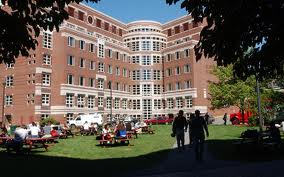Call for Fellows: August 2013 – June 2014
The Harvard Kennedy School (HKS) Indonesia Program invites Indonesian researchers, academics, and practitioners to apply for the Indonesia Research Fellowship in order to pursue independent research projects at the Ash Center. Made possible through the generous support of the Rajawali Foundation, this research fellowship opportunity allows successful applicants to join a lively community of researchers working on Asia-related issues.
Research Fellowships may be focused on individual research or institutional development, as follows:
(a) Research Fellows may pursue significant in-depth research in their area of academic and/or professional expertise, including but not limited to: completing dissertation research and writing (for pre-doc Fellows); publishing articles following a dissertation (for post-doc Fellows); or completing an applied policy analysis of areas of professional expertise (for Practitioner Fellows).
(b) Research Fellows may be representatives of research institutions or universities in Indonesia, and may use the fellowship to explore areas of academic development and collaboration such as curriculum development and case study development. The proposed work must clearly strengthen the institutional capabilities of the host institution for teaching or researching public policy in Indonesia.
- Appointments will run for one full academic year, from mid-August 2013 to mid-June 2014.
- With instructor approval, Research Fellows may “audit” classes at Harvard Kennedy School or other Harvard schools.
- Research Fellows will receive a certificate upon completion, but no degrees will be conferred.
- Research Fellows will receive shared office space within the Ash Center, on the campus of Harvard University in Cambridge (outside Boston, Massachusetts).
- Research Fellows will have access to the library system of Harvard University.
- For Indonesian Research Fellows, HKS will pay for appropriate housing, health insurance, and a modest living stipend. HKS will not provide international transportation or pay for pre-departure costs. (If accepted, Research Fellows are encouraged to seek financial support for these items from their employers or other sponsors such as the Indonesian Ministry of Education or DIKTI, the Directorate General for Higher Education.)
Criteria and Expectations
Fellows must be fluent in both written and spoken English. All fellows will be expected to participate in research seminars, produce a 10-page written paper summarizing their research (ideally published before completion of the research fellowship period), and make at least two presentations (one in the Cambridge area and at least one in Indonesia) about their research.
Indonesian Research Fellowships are open to candidates from government, academia, and independent research communities. Fellows usually fall into one of the following categories: Pre-Doc Fellow, Post-Doc Fellow, or Senior Practitioner. Although proposals for one semester of research may be considered, preference will be given to research proposals that represent ambitious and significant work over two semesters (one full academic year).
Strong proposals in any aspect of public policy will be considered, and candidates should propose research questions that are meaningful based on their area of expertise and analysis of the challenges in Indonesia. Applicants are encouraged to review the 2010 HKS analysis of the Indonesian political economy, which encourages further study of 1) institutional transformation; 2) opportunities and challenges of globalization; 3) equity and opportunity; and 4) reconstructing citizenship. This report is also available in Bahasa Indonesia at Gramedia Bookstores under the title Indonesia Menentukan Nasib: Dari Reformasi ke Transformasi Kelembagaan.
For the Academic Year 2012-13, preference will be given where possible to candidates whose proposed research is linked to one of the following areas:
- Local governments and governance in Indonesia, including the quality of public service delivery, competitiveness of local governments, economic or policy analysis of corruption, and identity politics;
- Economic and/or policy analysis of transportation and urban infrastructure in Indonesia, including public-private partnerships for infrastructure, improvements to public transportation, and other issues affecting the economic productivity and quality of life in Indonesia’s cities;
- Social policy in Indonesia, including effectiveness of social safety net programs, national strategies for poverty reduction, and local government experience with service provision for vulnerable populations;
- Energy development, including energy policy, energy markets, environmental policy, climate change and carbon trading, or sustainability; or
- Strategic development of academic programs in Indonesia that teach public policy.
Application and Deadlines
Candidates should apply by February 15, 2013 for the Indonesian Research Fellowships for the period August 2013 to June 2014.
To apply, please prepare the following materials:
- Cover page with name, contact information, and affiliation.
- Resume or Curriculum Vitae, including any publishing history.
- Letter from supervisor or host institution providing a strong rationale of why this candidate should be chosen; what her/his role is in terms of academic and programmatic leadership within the hosting institution; and how she/he will contribute to accelerating reform in Indonesia over the long term.
- Proposal of 5-10 pages describing research or project to be conducted during this Research Fellowship including:
- Main policy questions to be examined
- Value to Indonesia
- Relevant literature and data
- Research methodology to be used
- Results to be achieved
- Relationship of this proposed Research Fellowship to any previous or future research, including any internationally-published research
- Relationship of this proposed Research Fellowship to accelerating reform in Indonesia
Please send the application materials via email to [email protected] with “Research Fellow Application” in the subject line, no later than 5:00 p.m. ET (Cambridge local time) on February 15, 2013.
![]()

